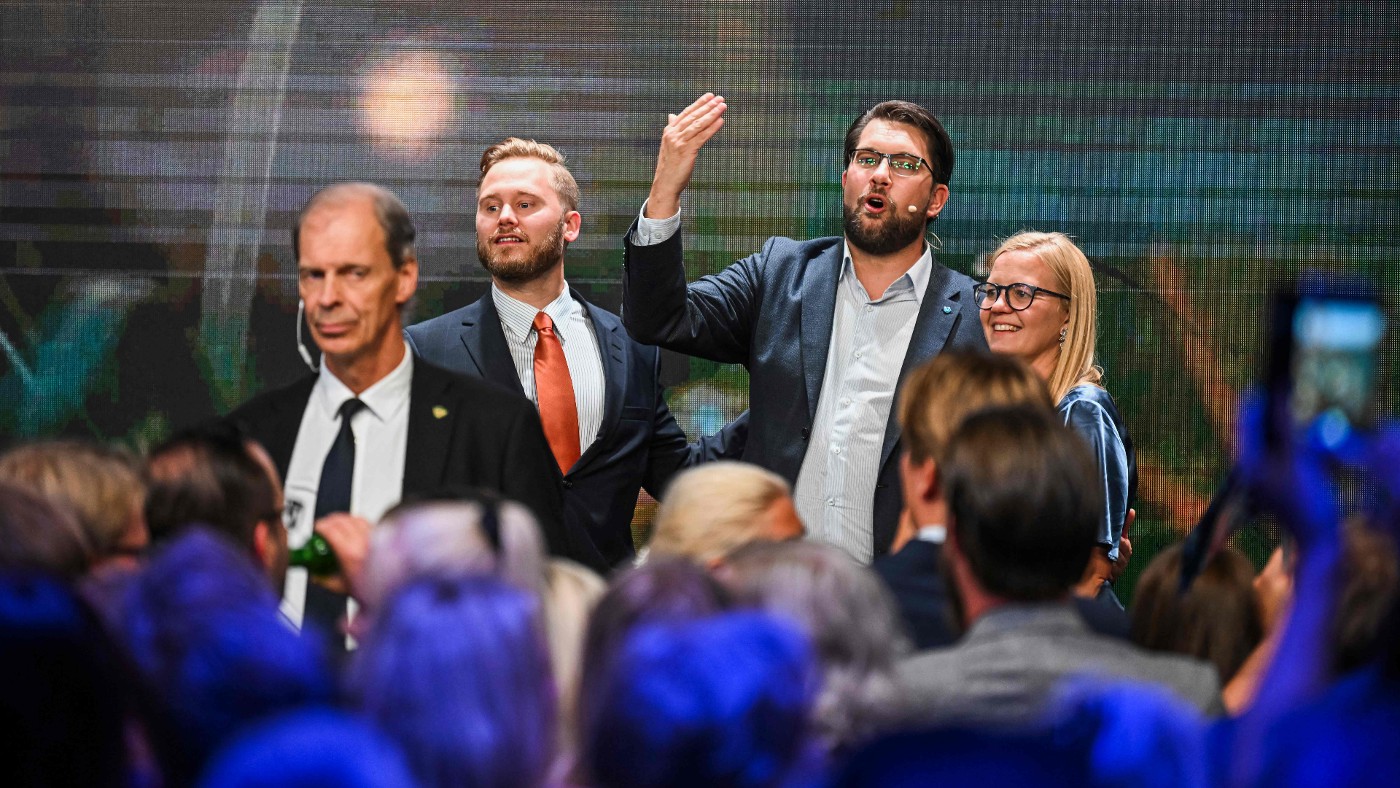Far-right nationalists shake up Swedish election
Sweden Democrats could power right-wing bloc to surprise victory

A free daily email with the biggest news stories of the day – and the best features from TheWeek.com
You are now subscribed
Your newsletter sign-up was successful
Sweden’s election result hangs in the balance with the far-right Sweden Democrats party enjoying a surprise surge of support.
Although exit polls initially predicted victory for the incumbent centre-left coalition, headed by Prime Minister Magdalena Andersson, later results suggested the right-wing bloc could sneak a win.
The early exit poll by Sweden’s public broadcaster suggested Andersson’s coalition of four centre-left parties had 49.8% of the vote compared to 49.2% for his rivals. But the latest partial results put the right-wing group ahead, with a projected 176 of 349 seats in parliament, against the centre-left’s 173, after 94% of electoral districts were counted.
The Week
Escape your echo chamber. Get the facts behind the news, plus analysis from multiple perspectives.

Sign up for The Week's Free Newsletters
From our morning news briefing to a weekly Good News Newsletter, get the best of The Week delivered directly to your inbox.
From our morning news briefing to a weekly Good News Newsletter, get the best of The Week delivered directly to your inbox.
The result was so close the election authority said “it would not be known before Wednesday when some uncounted votes, including those cast abroad, have been tallied”, reported Sky News.
The far-right Sweden Democrats “have come in from the cold after being shunned by the mainstream parties for more than a decade because of their extremist origins”, said The Times.
Andersson’s Social Democrats are expected to remain the country’s largest party, with 30.5% of the votes. As the race is so close, the final outcome may have to wait a few days until all votes, including postal and advance ballots, are counted.
Even then Sweden’s future will be decided by “parliamentary horse-trading”, said The Times. The paper noted that after the last election in 2018, which ended in a similar deadlock, it took 134 days to assemble a viable minority government.
A free daily email with the biggest news stories of the day – and the best features from TheWeek.com
The anti-immigration Sweden Democrats were “born out of a neo-Nazi movement at the end of the 1980s”, said the BBC. With a projected 20% of the vote this time, they are expected to become the country’s second biggest party.
Whether there ends up being a new right-wing government or not, the nationalist Sweden Democrats have made “significant gains”, said the BBC. But it added that the party’s leader, Jimmie Akesson, is “unlikely to become prime minister even if the right-wing bloc wins the largest number of seats”. The Moderate Party leader Ulf Kristersson, seen as more “palatable”, would be more likely to take that role.
-
 One great cookbook: Joshua McFadden’s ‘Six Seasons of Pasta’
One great cookbook: Joshua McFadden’s ‘Six Seasons of Pasta’the week recommends The pasta you know and love. But ever so much better.
-
 Scientists are worried about amoebas
Scientists are worried about amoebasUnder the radar Small and very mighty
-
 Buddhist monks’ US walk for peace
Buddhist monks’ US walk for peaceUnder the Radar Crowds have turned out on the roads from California to Washington and ‘millions are finding hope in their journey’
-
 Epstein files topple law CEO, roil UK government
Epstein files topple law CEO, roil UK governmentSpeed Read Peter Mandelson, Britain’s former ambassador to the US, is caught up in the scandal
-
 Iran and US prepare to meet after skirmishes
Iran and US prepare to meet after skirmishesSpeed Read The incident comes amid heightened tensions in the Middle East
-
 Israel retrieves final hostage’s body from Gaza
Israel retrieves final hostage’s body from GazaSpeed Read The 24-year-old police officer was killed during the initial Hamas attack
-
 China’s Xi targets top general in growing purge
China’s Xi targets top general in growing purgeSpeed Read Zhang Youxia is being investigated over ‘grave violations’ of the law
-
 Panama and Canada are negotiating over a crucial copper mine
Panama and Canada are negotiating over a crucial copper mineIn the Spotlight Panama is set to make a final decision on the mine this summer
-
 Why Greenland’s natural resources are nearly impossible to mine
Why Greenland’s natural resources are nearly impossible to mineThe Explainer The country’s natural landscape makes the task extremely difficult
-
 Iran cuts internet as protests escalate
Iran cuts internet as protests escalateSpeed Reada Government buildings across the country have been set on fire
-
 US nabs ‘shadow’ tanker claimed by Russia
US nabs ‘shadow’ tanker claimed by RussiaSpeed Read The ship was one of two vessels seized by the US military